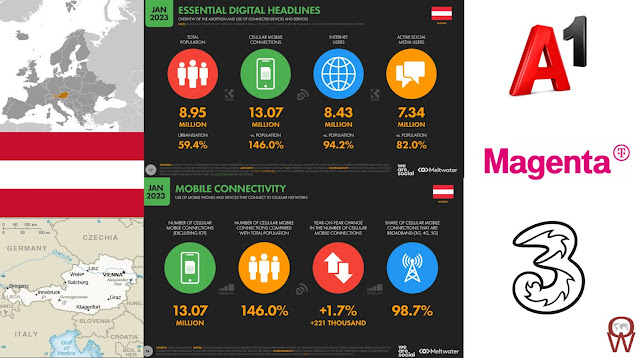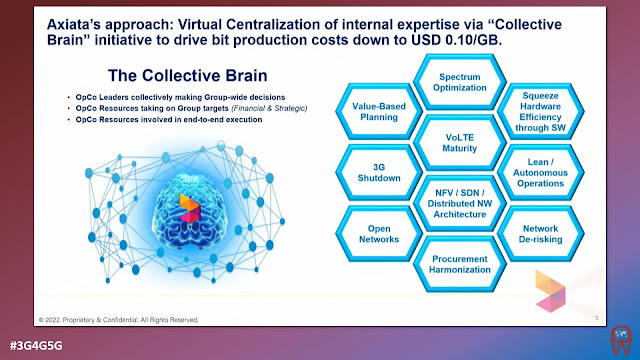Austria has a highly developed telecommunications market, with a wide range of mobile operators offering services to consumers. The market is dominated by three major operators: A1 Telekom Austria, T-Mobile Austria, and Hutchison Drei Austria. These three companies provide the majority of mobile services to consumers in Austria.
In common with other countries in the region, the operators as well as the government and regulator have focused on delivering improved telecom infrastructure. The government has a program to provide a national gigabit service by 2030, delivered by private enterprise though with some state funding. This is based on fibre networks supported by 5G, with the MNOs able to expand the reach of their 5G services following auctions held in March 2019 and September 2020. More recently, a plan has also been developed through to 2026 which would release additional spectrum in several bands to help increase network the capacity, and so improve the quality of services offered.
According to the most recent Open Signal report on Austria it was a two-horse race in the award table in Austria, with A1 and Magenta winning 10 and nine awards, respectively. A1 claims five awards outright — both overall speed and both consistency awards, along with Video Experience. Magenta is the sole winner of Games Experience, Voice App Experience, 5G Upload Speed and Availability — while operators jointly win the remaining five awards.
The results in this report were based on measurements collected across all major mobile operators in Austria – 3, A1 and Magenta – over the period of 90 days between June 1, 2022 and August 29, 2022.
A1 has announced that they will shut off their 3G network on band 1 (2100 MHz) from Februrary 2023 (starting in Carinthia and Salzburg). The band 1 spectrum will be refarmed for 5G (going from 20 to 25 MHz of 5G on n1). The 3G network on band 1 (2100 MHz) and band 8 (900 MHz) will be shut off until the end of 2024. Drei has not made any indication yet about a 3G shutdown. A1 and Magenta agree that 2G will not be going anywhere any time soon.
A1 Telekom Austria is the market leader in Austria. The company was formed in 2010, following the merger of A1 Telekom Austria and mobilkom Austria. The company offers a wide range of mobile services, including voice, SMS, and data services, and has invested heavily in 5G infrastructure. A1 Telekom Austria also offers fixed-line services, including broadband and IPTV.
4G/LTE is available on band 20 (800 MHz) nationwide, band 3 (1800 MHz) in smaller and bigger cities as well as band 7 (2600 MHz) in bigger cities, covering 98% of the population. 4G+/LTE-A carrier aggregation is available on cell sites which broadcast multiple 4G/LTE bands.
In July 2021 A1 Telekom Austria has announced that its total number of 5G transmitters has increased to 2,000 across the country. The firm’s 5G network now covers almost 50% of the population across the country, including 80% of the capital Vienna.
According to Open Signal A1 has developed an end-to-end 5G network slicing proof of concept with Amdocs, which demonstrated management of 5G network slices and virtualized applications over public/private cloud and edge, along with its monetization potential.
Magenta Telekom, which was formed in 2019 from the merger of mobile operator T-Mobile Austria and cableco UPC Austria is the second-largest mobile operator in Austria. The operator offers a range of mobile services to consumers, including voice, SMS, and data services. They have also invested heavily in 5G infrastructure, with a focus on providing high-speed data services to its customers.
Magenta has recently upgraded fixed broadband speeds for more than 500,000 existing customers. Through the upgrade, customers on low download rate plans will now be able to access speeds of 100Mbps, which has become the operator’s new entry-level plan, while other upgrades include from 100Mbps and 125Mbps to 150Mbps, from 150Mbps to 250Mbps and from 250Mbps to 300Mbps. The speed upgrade is being carried out on the firm’s HFC network and is at no additional cost for customers.
Magenta Telekom in Austria, formed by merger of T-Mobile and UPC is going to switch off 3G/UMTS starting 1 Jan 2024. Spectrum will be re-farmed for 4G/5G. 2G will continue to work - https://t.co/rofjhBDhwZ
— Zahid Ghadialy (@zahidtg) April 8, 2022
FAQ https://t.co/7QPftGrdxG#2G #3G #3G4G5G #2G3Gshutdown
The operator has enabled 5G access across all of its smartphone tariffs and intended to expand its 5G coverage to 55% of Austrians by the end of 2022 — while also planning to switch off its 3G services from the beginning of 2024.
Hutchison Drei Austria is the third-largest mobile operator in Austria, with a market share of around 24%. The company was formed in 2013, following the merger of Hutchison 3G Austria and Orange Austria. Hutchison Drei Austria offers a range of mobile services to consumers, including voice, SMS, and data services, and has invested heavily in 5G infrastructure. The company also offers fixed-line services, including broadband and IPTV.
Hutchison Drei Austria has announced the commercial launch of 5G Standalone (5G SA) services under the name ‘5G+’. The offering has been made available for 1.3 million homes and businesses across the country, and all of the firm’s existing 5G transmission sites have been activated for 5G+.
Drei has worked with Qualcomm and ZTE to showcase a 5G Standalone network using the 700 MHz band and aggregating a 1400 MHz supplemental downlink band. According to the involved parties, this development will help to improve 5G download speed and coverage in suburban and rural areas. Enhancing 5G experience in Austrian rural areas is important, as there is a notable 5G rural-urban divide in Austria, as recent research has demonstrated.
Related Posts:
- Operator Watch Blog: Austria Gets New 5G Spectrum
- Operator Watch Blog: Excellent Video / Gaming Experience on 4G has set High Expectations for 5G in Austria




